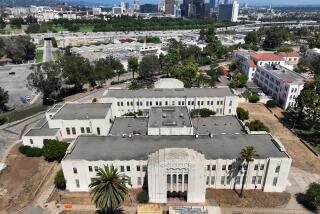L.A. community colleges chief vows to revamp policies
The chancellor of the Los Angeles Community College District has vowed to review ethical standards and contracting practices after a series of Times articles exposed widespread waste in a $5.7-billion campus rebuilding program.
In a letter to faculty and staff members, Chancellor Daniel LaVista said The Times had “brought to light much that needed to be exposed, and we’d be more than remiss if we didn’t take advantage of the outside perspective” on what went wrong.
“While we can’t recoup all monies lost to these errors (some are being sought currently in litigation), we can revamp our systems so that these issues do not occur again,” he wrote in the letter, which was dated Monday. “We need to take action.”
LaVista promised to work with the district’s elected Board of Trustees on corrective measures, including a review of the district’s ethics code and conflict-of-interest standards.
He said the district should also reexamine its system for awarding contracts and its planning and oversight of the construction program.
A six-part Times series that concluded Sunday reported that tens of millions of dollars had been wasted as a result of chaotic planning, shoddy workmanship and bungled or abandoned projects at many of the district’s nine campuses.
Among other examples, the series described how the district spent $3.4 million renovating a theater complex at Valley College that is now slated for demolition and how officials at West Los Angeles College spent $39 million to design and begin construction of four major buildings, only to discover that they didn’t have money to complete them.
One of the articles has sparked an investigation by the Los Angeles County district attorney into an alleged conflict of interest on the part of a former Mission College official who oversaw construction at the Sylmar campus. A construction company that she co-owned was paid more than $500,000 for working as a subcontractor at Mission, The Times reported.
On Tuesday, David Beaulieu, president of the District Academic Senate, said the series had left him feeling “anger, embarrassment and sadness.” In a Senate newsletter, he lamented the district’s “wildly unrealistic” plans for renewable energy projects and faulted the Board of Trustees for giving “far too much leeway” to Larry Eisenberg, chief of the construction program.
“It was their job to ensure adequate oversight,” Beaulieu wrote.
The chancellor’s letter vowing to push for reform contrasted with his earlier attacks on The Times in public statements and letters since publication of the series began. In a Feb. 27 letter to faculty and staff, LaVista called the construction program “well-managed and effective,” and he dismissed the first two articles in the series as “sensationalist.”
“The timing is suspect, and the reporting is one-sided,” he said in a statement the same day, alluding to Tuesday’s election, in which four of seven trustee seats were up for grabs.
LaVista announced last week through a spokesman that he was barring the media from attending meetings of a steering committee that have often served as a forum for faculty to question decisions by managers of the construction program.
A district spokesman said that state law did not require such meetings to be open and that “allowing any member of the public to attend can impede the full and open discussion of policy issues.” LaVista on Tuesday said he had “no intent of changing that policy.”
Beaulieu, a member of the steering committee, called the media ban “unfortunate.”
“We’re a public agency,” he said. “I don’t think it’s a good policy to keep our meetings closed.”
More to Read
Sign up for Essential California
The most important California stories and recommendations in your inbox every morning.
You may occasionally receive promotional content from the Los Angeles Times.











